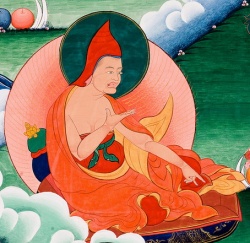Difference between revisions of "Philosopher"
| Line 1: | Line 1: | ||
[[File:220Vasubandhu.JPG|thumb|250px|]] | [[File:220Vasubandhu.JPG|thumb|250px|]] | ||
| − | + | [[File:Vasubandhu 5571.jpg|thumb|250px|]] | |
| − | + | A [[philosopher]] is a person with an extensive [[knowledge]] of [[philosophy]] who uses this [[knowledge]] in their work, typically to solve [[philosophical]] problems. [[Philosophy]] is concerned with studying the subject matter of fields such as aesthetics, [[ethics]] , [[Wikipedia:epistemology|epistemology]] , [[logic]] , [[metaphysics]] , as well as social [[philosophy]] and political [[philosophy]] . | |
| + | |||
| + | There is a sense in which every human being is a [[philosopher]] , if we accept a very [[humanistic]] and generous interpretation. This is to say that every human being has a unique contribution of ideas to the society. However, a more generally accepted interpretation in academia is that a [[philosopher]] is one who has attained a Ph.D. in [[philosophy]] , teaches [[philosophy]] , has published literature in a field of [[philosophy]] in a peer-reviewed journal, or is widely accepted by other [[philosophers]] as a [[philosopher]] . | ||
| + | |||
| + | ==Education== | ||
| − | + | [[Philosophers]] usually cover a breadth of topics within [[philosophy]] in their undergraduate education, and then proceed to specialize in topics of their own choice at the graduate level. In some universities, a qualifying exam serves to test both the breadth and depth of a student's understanding of [[philosophy]] ; the students who pass are permitted to work on a doctoral dissertation. | |
| − | + | ==Motivation== | |
| − | + | Though it is true that [[philosophy]] finds diverse applications in many areas of research, a [[philosopher]] does not determine the value of an idea by the diversity of its applications. [[Philosophy]] is [[interesting]] in its own right, and a substantial minority of [[philosophers]] investigate the many and varied interpretations of ideas studied in [[philosophy]] itself. | |
| − | |||
| − | + | ==Differences with [[scientists]] == | |
| − | |||
| − | [[Philosophy]] differs from natural science in that scientists subject truth claims to tests by empirical experiments, while philosophical propositions may be tested by thought experiments and are conclusions of philosophical arguments. | + | [[Philosophy]] differs from natural science in that [[scientists]] subject [[truth]] claims to tests by [[empirical]] experiments, while [[philosophical]] propositions may be tested by [[thought]] experiments and are conclusions of [[philosophical]] arguments. |
| − | Women in [[Philosophy]] | + | |
| − | See also: List of female philosophers | + | ==Women in [[Philosophy]] == |
| − | + | See also: {{Wiki|List of female philosophers}} | |
| − | While the majority of philosophers are male, there have been some demographic changes since the 20th century. Some prominent female philosophers are Judith Butler, Marilyn McCord Adams, Patricia Churchland, and Susan Haack. | + | |
| − | Prizes in [[Philosophy]] | + | While the majority of [[philosophers]] are male, there have been some demographic changes since the 20th century. Some prominent female [[philosophers]] are Judith Butler, Marilyn McCord Adams, Patricia Churchland, and Susan Haack. |
| + | |||
| + | ==Prizes in [[Philosophy]] == | ||
| − | Prominent prizes in [[Philosophy]] include the Avicenna Prize, the Kyoto Prize in Arts and Philosophy and the Rolf Schock Prizes. | + | Prominent prizes in [[Philosophy]] include the Avicenna Prize, the Kyoto Prize in Arts and [[Philosophy]] and the Rolf Schock Prizes. |
| − | |||
| − | |||
| − | + | ==Quotations about [[Philosophers]] == | |
| − | + | The following are quotations about [[Philosophers]] , or by [[Philosophers]] . | |
| − | + | * "The [[philosopher]] as an analyst is not concerned with the [[physical]] properties of things, but only with the way in which we speak about them." -- Alfred Jules Ayer in [[Language]] , [[Truth]] , and [[Logic]] (1936). | |
| + | * "The [[philosophers]] have only interpreted the [[world]] , in various ways. The point, however, is to change it." -- Karl Marx, Theses on Feuerbach, thesis 11. | ||
| + | * "[[Philosophers]] , for the most part, are constitutionally timid, and dislike the unexpected. Few of them would be genuinely [[happy]] as pirates or burglars." -- Bertrand Russell, Unpopular Essays, Chapter IV, Part iii, p. 74. | ||
| + | * "It is perfectly true, as the [[philosophers]] say, that [[life]] must be understood backwards. But they forget the other proposition, that it must be lived forwards." --Søren Kierkegaard, Journals and Papers (1843) | ||
| − | |||
| − | |||
| − | |||
{{W}} | {{W}} | ||
[[Category:Buddhist Terms]] | [[Category:Buddhist Terms]] | ||
[[Category:Buddhist Philosophy]] | [[Category:Buddhist Philosophy]] | ||
Revision as of 11:15, 22 July 2013
A philosopher is a person with an extensive knowledge of philosophy who uses this knowledge in their work, typically to solve philosophical problems. Philosophy is concerned with studying the subject matter of fields such as aesthetics, ethics , epistemology , logic , metaphysics , as well as social philosophy and political philosophy .
There is a sense in which every human being is a philosopher , if we accept a very humanistic and generous interpretation. This is to say that every human being has a unique contribution of ideas to the society. However, a more generally accepted interpretation in academia is that a philosopher is one who has attained a Ph.D. in philosophy , teaches philosophy , has published literature in a field of philosophy in a peer-reviewed journal, or is widely accepted by other philosophers as a philosopher .
Education
Philosophers usually cover a breadth of topics within philosophy in their undergraduate education, and then proceed to specialize in topics of their own choice at the graduate level. In some universities, a qualifying exam serves to test both the breadth and depth of a student's understanding of philosophy ; the students who pass are permitted to work on a doctoral dissertation.
Motivation
Though it is true that philosophy finds diverse applications in many areas of research, a philosopher does not determine the value of an idea by the diversity of its applications. Philosophy is interesting in its own right, and a substantial minority of philosophers investigate the many and varied interpretations of ideas studied in philosophy itself.
Differences with scientists
Philosophy differs from natural science in that scientists subject truth claims to tests by empirical experiments, while philosophical propositions may be tested by thought experiments and are conclusions of philosophical arguments.
Women in Philosophy
See also: List of female philosophers
While the majority of philosophers are male, there have been some demographic changes since the 20th century. Some prominent female philosophers are Judith Butler, Marilyn McCord Adams, Patricia Churchland, and Susan Haack.
Prizes in Philosophy
Prominent prizes in Philosophy include the Avicenna Prize, the Kyoto Prize in Arts and Philosophy and the Rolf Schock Prizes.
Quotations about Philosophers
The following are quotations about Philosophers , or by Philosophers .
- "The philosopher as an analyst is not concerned with the physical properties of things, but only with the way in which we speak about them." -- Alfred Jules Ayer in Language , Truth , and Logic (1936).
- "The philosophers have only interpreted the world , in various ways. The point, however, is to change it." -- Karl Marx, Theses on Feuerbach, thesis 11.
- "Philosophers , for the most part, are constitutionally timid, and dislike the unexpected. Few of them would be genuinely happy as pirates or burglars." -- Bertrand Russell, Unpopular Essays, Chapter IV, Part iii, p. 74.
- "It is perfectly true, as the philosophers say, that life must be understood backwards. But they forget the other proposition, that it must be lived forwards." --Søren Kierkegaard, Journals and Papers (1843)

